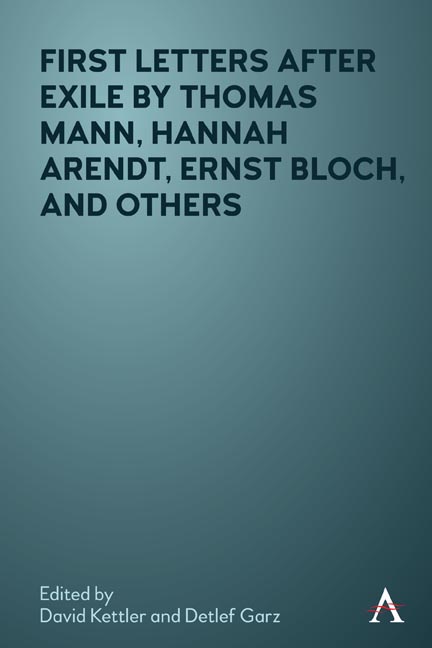Book contents
- Frontmatter
- Contents
- Preface
- Chapter 1 The “First Letters” Exile Project: Introduction
- Chapter 2 “That I Will Return, My Friend, You Do Not Believe Yourself ”: Karl Wolfskehl – Exul Poeta
- Chapter 3 “I Do Not Lift a Stone”: Thomas Mann’s “First Letter” to Walter von Molo
- Chapter 4 Faust Narrative and Impossibility Thesis: Thomas Mann’s Answer to Walter von Molo
- Chapter 5 “That I Am Not Allowed for a Moment to Forget the Ocean of Blood”: Hans-Georg Gadamer and Leo Strauss in Their First Letters after 1946
- Chapter 6 Return into Exile: First Letters to and from Ernst Bloch
- Chapter 7 A Postwar Encounter without Pathos: Otto Kirchheimer’s Critical Response to the New Germany
- Chapter 8 An Exile’s Letter to Old Comrades in Cologne: Wilhelm Sollmann’s Critique of German Social Democracy and Conception of a New Party in Postwar Germany
- Chapter 9 First Letters: Arendt to Heidegger
- Chapter 10 Denazification and Postwar German Philosophy: The Marcuse/Heidegger Correspondence
- Chapter 11 “It Would Be Perhaps a New Exile and Perhaps the Most Painful”: The Theme of Return in Oskar Maria Graf ’s Letters to Hugo Hartung
- Chapter 12 Social Constellation of the Exile at the End of the Second World War and the Pragmatics of the “First Letters”: An Objective Hermeneutic Structural and Sequence Analysis
- Notes on Contributors
- Index
Chapter 11 - “It Would Be Perhaps a New Exile and Perhaps the Most Painful”: The Theme of Return in Oskar Maria Graf ’s Letters to Hugo Hartung
Published online by Cambridge University Press: 25 February 2022
- Frontmatter
- Contents
- Preface
- Chapter 1 The “First Letters” Exile Project: Introduction
- Chapter 2 “That I Will Return, My Friend, You Do Not Believe Yourself ”: Karl Wolfskehl – Exul Poeta
- Chapter 3 “I Do Not Lift a Stone”: Thomas Mann’s “First Letter” to Walter von Molo
- Chapter 4 Faust Narrative and Impossibility Thesis: Thomas Mann’s Answer to Walter von Molo
- Chapter 5 “That I Am Not Allowed for a Moment to Forget the Ocean of Blood”: Hans-Georg Gadamer and Leo Strauss in Their First Letters after 1946
- Chapter 6 Return into Exile: First Letters to and from Ernst Bloch
- Chapter 7 A Postwar Encounter without Pathos: Otto Kirchheimer’s Critical Response to the New Germany
- Chapter 8 An Exile’s Letter to Old Comrades in Cologne: Wilhelm Sollmann’s Critique of German Social Democracy and Conception of a New Party in Postwar Germany
- Chapter 9 First Letters: Arendt to Heidegger
- Chapter 10 Denazification and Postwar German Philosophy: The Marcuse/Heidegger Correspondence
- Chapter 11 “It Would Be Perhaps a New Exile and Perhaps the Most Painful”: The Theme of Return in Oskar Maria Graf ’s Letters to Hugo Hartung
- Chapter 12 Social Constellation of the Exile at the End of the Second World War and the Pragmatics of the “First Letters”: An Objective Hermeneutic Structural and Sequence Analysis
- Notes on Contributors
- Index
Summary
Of the German emigrants who found refuge from National Socialist persecution in the United States, Oskar Maria Graf was the least willing to adapt to the culture of the host country. According to his own statements, he did not learn English, continued to wear his Bavarian lederhosen, and tried to maintain his familiar lifestyle. Of course, he was helped in this by the fact that even before the wave of refugees from Hitler's Germany, a large German-speaking minority had settled in New York, and Graf found German-language publications, organizations, and even his beloved beer taverns. However, like no other of the emigrants, he emphasized that he had remained German and preserved his cultural identity, although he resolutely rejected any nationalism. It is therefore surprising that Graf remains among the emigrants who did not return to their old homeland after the end of the war, but lived in exile until their death. In his contribution to Hermann Kesten's book Ich lebe nicht in der Bundesrepublik (I Do Not Live in the Federal Republic)—“Was mich abhält, nach Deutschland zurückzukehren” (What Stops Me from Returning to Germany), written in 1962—Graf first of all blames the occupation regimes for his remaining in the United States: “I don't want to be governed by several governments at once; one is more than enough for me.” Yet he assigns more weight to the conduct of his countrymen, whom he accuses of latent anti-Semitism, “narrow-minded provincial German boastfulness of efficiency,” and “spießbürgerlich-nihilist grandiosity.”
Graf was not always of this opinion. In a letter to Hubertus von Löwenstein of February 9, 1946, he emphasized: “Of course I also want to go home as soon as possible.” On May 7, 1946, he wrote to his Brno friends Else and Gustav Fischer, who were living in exile in London: “That I am ‘going home,’ is certain, but I am not going aimlessly and not to a Germany that is no longer Germany.” In the early 1950s, Graf was still seriously considering returning to Germany, especially because the political situation in the United States, notably the persecution of communists under McCarthy, as well as racism, increasingly repelled him.
- Type
- Chapter
- Information
- Publisher: Anthem PressPrint publication year: 2021



